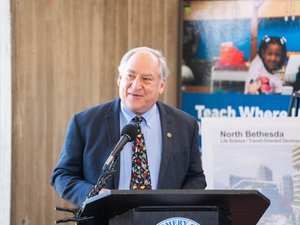As home to an up-and-coming technological ecosystem with creativity bursting at the seams, it's no wonder the University of Maryland, George Washington University, and Virginia Tech were awarded $3.75 million by the National Science Foundation to launch a regional Innovation Corps (I-Corps). With a goal to find the best entrepreneurial students and faculty researchers this area has to offer, I-Corps will provide them with the resources to make their development breakthroughs a reality, supporting the creation of startups across the Mid-Atlantic region.
I-Corps is based off of Stanford University's seven-week Lean LaunchPad program geared toward fostering the growth of revolutionary business ideas. Its methodology draws upon "decades of experience in Silicon Valley, emphasizing talking to as many potential customers as possible, pivoting in response to resulting insights, building low-cost prototypes to get customer feedback, constantly adapting, and building a scalable business model," according to the Maryland Technology Enterprise Institute's press release.
But this progressive course does not stop there.
In the end, the hopes are that I-Corps will produce a cutting-edge startup, patent, or technology license to a company.
"I-Corps is aggressive, methodical, and just what our region needs," explained Dean Chang, associate vice president for innovation and entrepreneurship at the University of Maryland. "We live in one of the most fertile areas in the country for technology-based research, and our goal is nothing short of finding 300 of the most talented research teams and guiding them through the best technology commercialization program available."
Up to 100 research teams nationwide will be selected each year to be sent to the Mid-Atlantic sector of I-Corps for training, serving as one of many components that will make up the preliminary foundation of the National Science Foundation's National Innovation Network.
"Becoming an I-Corp Node is the highest acknowledgement a region can receive from NSF and we are honored to have been selected along with the University of Maryland and Virginia Tech," said Chung. "It is essentially a technology development incubator for the top scientists and engineers in the U.S. That incubator is now available to researchers in the Mid-Atlantic."
I-Corps is an advantageous network to be a part of not only because of the vast amount of connections they have already solidified for future members to feed off of, but also due to the resources they set aside for their affiliates. As if the money weren't enough of an enticement, I-Corps also offers a mentor development program to ensure that aspiring innovators evolve into experienced professionals in their respective fields.
"Thirty-five of the top 200 U.S. universities in research and development expenditures are located within a four-hour drive of this I-Corps partnership," stated John Lesko, associate dean for research and graduate studies in the College of Engineering at Virginia Tech. "Those universities collectively conducted $14.3 billion in research in 2010. We will attract and train teams from these top regional academic institutions, as well as from the many federal and state research labs unique to the region, including NASA, NIH and ARPA-E."
It's clear that all three universities bring something special to the table or I-Corps would not have sought them out to be a part of these transformative research program, which I couldn't agree with more. The University of Maryland, George Washington University, and Virginia Tech have each groomed their own talent pool of young entrepreneurs adept and ready to take on the world with their technological prowess. There's no doubt in my mind that I-Corps will completely reinvigorate the region, inspiring talented members of society to step up and become involved in designing futuristic products. This is an impressive distinction for the region, one we should be proud of.




